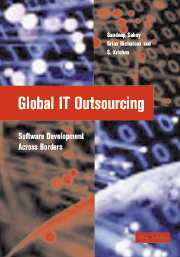Book contents
- Frontmatter
- Contents
- List of figures
- List of tables
- List of boxes
- Foreword
- Acknowledgements
- List of abbreviations
- 1 Introducing the phenomenon of global software work
- 2 Globalization and global software work
- 3 GlobTel's GSA programme in India
- 4 The GlobTel–Witech relationship: a ‘standardization’ perspective
- 5 Global software work: an identity perspective
- 6 The GlobTel–MCI relationship: the dialectics of space and place
- 7 Managing the knowledge transfer process: the case of Sierra and its Indian subsidiary
- 8 The case of Gowing and Eron GSA: power and control
- 9 Cross-cultural communication challenges: GSAs between Japanese and Indian firms
- 10 Reflections and synthesis on theoretical insights
- 11 Managerial implications
- Index
- References
7 - Managing the knowledge transfer process: the case of Sierra and its Indian subsidiary
Published online by Cambridge University Press: 14 January 2010
- Frontmatter
- Contents
- List of figures
- List of tables
- List of boxes
- Foreword
- Acknowledgements
- List of abbreviations
- 1 Introducing the phenomenon of global software work
- 2 Globalization and global software work
- 3 GlobTel's GSA programme in India
- 4 The GlobTel–Witech relationship: a ‘standardization’ perspective
- 5 Global software work: an identity perspective
- 6 The GlobTel–MCI relationship: the dialectics of space and place
- 7 Managing the knowledge transfer process: the case of Sierra and its Indian subsidiary
- 8 The case of Gowing and Eron GSA: power and control
- 9 Cross-cultural communication challenges: GSAs between Japanese and Indian firms
- 10 Reflections and synthesis on theoretical insights
- 11 Managerial implications
- Index
- References
Summary
GSW: a knowledge perspective
This chapter introduces the importance of taking a knowledge perspective to understand the process of growth of a GSA. Software development in general is an example of knowledge-intensive work. When taken in the context of global separation, the knowledge intensity is magnified many times over. In addition to domain-specific product knowledge, it requires a deep understanding of the multiple local contexts involved and the ongoing and changing development requirements. Many of these requirements remain undocumented and tacitly held by individuals and groups.
The significance of the knowledge transfer process can be analysed at multiple levels: institutions, project teams and individuals. Institutional reflexivity, which Giddens (1990) has described to be a defining feature of globalization, is particularly emphasized in knowledge-intensive software development work. Continuously and reflexively, firms must monitor new knowledge about technologies, organizations and markets. They must make changes in their own processes as the situation demands. The need for continuous reflexive action is significant because of the speed at which new knowledge about software is being generated and the tremendous interconnectivity between global systems (including electronic) that facilitates the spread of new knowledge from one part of the world to others.
The knowledge perspective is equally significant at the level of project teams and the individuals in the teams. Most software development firms comprise multiple teams working with different clients, engaging in different technologies and serving various markets and products.
Information
- Type
- Chapter
- Information
- Global IT OutsourcingSoftware Development across Borders, pp. 132 - 154Publisher: Cambridge University PressPrint publication year: 2003
References
Accessibility standard: Unknown
Why this information is here
This section outlines the accessibility features of this content - including support for screen readers, full keyboard navigation and high-contrast display options. This may not be relevant for you.Accessibility Information
- 2
- Cited by
